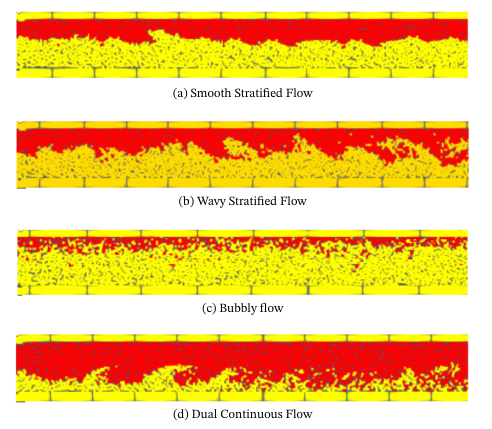Numerical Simulation of Two-Phase Water-Oil Flow in a Horizontal Pipe Using the Smoothed Particle Hydrodynamics Method
DOI:
https://doi.org/10.14295/vetor.v31i2.13761Keywords:
Computational Fluid Dynamics, Two-phase flows, Smoothed Particle HydrodynamicsAbstract
In this work, the numerical code DualPhysics, based on the Lagrangian particle and mesh free method Smoothed Particle Hydrodynamics, has been employed to solve the slightly compressible isothermal two-phase water-oil flow. The continuity and momentum equations are solved, and we used the modified Tait equation of state to determine the pressure. To validate the numerical code, we solved the modified Couette flow of two fluids. As a practical case, we solved the isothermal and two-dimensional two-phase water-oil flow. The mixing of the fluids occurs after passing through a 45 degree Y junction placed at the entrance of the horizontal pipeline. Results showed the potential for using the numerical code, although some modifications and alterations are still necessary to solve practical problems.
Downloads
References
G. Liu and M. Liu, Smoothed Particle Hydrodynamics: A Meshfree Particle Method. Singapore: World Scientific, 2003.
L. Lucy, “A numerical approach to the testing of the fission hypothesis,” The Astronomical Journal, vol. 82, pp. 1013–1024, 1977. Available at: https://ui.adsabs.harvard.edu/abs/1977AJ.....82.1013L
R. Gingold and J. Monaghan, “Smoothed particle hydrodynamics: theory and application to non-spherical stars,” Monthly Notices of the Royal Astronomical Society, vol. 181, pp. 375–389, 1977. Available at: https://doi.org/10.1093/mnras/181.3.375
O. Shoham and S. of Petroleum Engineers of AIME., Mechanistic Modeling of Gas-liquid Two-phase Flow in Pipes. Society of Petroleum Engineers, 2006.
A. Hasan and C. Kabir, Fluid Flow and Heat Transfer in Wellbores. United States: Society of Petroleum Engineers, 2016.
T. Douillet-Grellier, F. De Vuyst, H. Calandra, and P. Ricoux, “Simulations of intermittent two-phase flows in pipes using smoothed particle hydrodynamics,” Computers & Fluids, vol. 177, pp. 101–122, 2018. Available at: https://doi.org/10.1016/j.compfluid.2018.10.004
C. Alvarado-Rodríguez, J. Klapp, J. Domínguez, A. Uribe-Ramirez, J. Ramírez-Minguela, and M. Gómez-Gesteira, Multiphase Flows Simulation with the Smoothed Particle Hydrodynamics Method. Springer International Publishing, 2019. Available at: http://dx.doi.org/10.1007/978-3-030-38043-4
J. Slattery and A. Varma, Advanced Transport Phenomena, ser. Cambridge Series in Chemical Engineering. Cambridge University Press, 1999.
C. A. D. Fraga Filho, Smoothed Particle Hydrodynamics: Fundamentals and Basic Applications in Continuum Mechanics. Springer, 2019.
A. Mokos, “Multi-phase modelling of violent hydrodynamics using smoothed particle hydrodynamics (sph) on graphics processing units (gpu),” Ph.D. dissertation, School of Mechanical, University of Manchester, Manchester, United Kingdoom, 2014. Available at: https://ethos.bl.uk/OrderDetails.do?uin=uk.bl.ethos.617969
J. Monaghan and J. Lattanzio, “A refined particle method for astrophysical problems,” Journal of Astronomy and Astrophysics, vol. 149, pp. 135–143, 1985. Available at: https://ui.adsabs.harvard.edu/abs/1985A&A...149..135M
M. L. Góes, “Estudo de interfaces livres empregando o método Smoothed Particle Hydrodynamics (SPH) e as equações de estado de van der Waals e de Martin,” Ph.D. dissertation, Polytechnic Institute, Rio de Janeiro State University, Nova Friburgo, Brazil, 2016. Available at: http://www.bdtd.uerj.br/handle/1/13703
N. J. dos Santos Carvalho, “Simulação numérica do escoamento bifásico em um duto horizontal empregando o método smoothed particle hydrodynamics,” Master’s thesis, Polytechnic Institute, Rio de Janeiro State University, Nova Friburgo, Brazil, 2021. Available at: http://www.bdtd.uerj.br/handle/1/16413
B. Lafaurie, C. Nardone, R. Scardovelli, S. Zaleski, and G. Zanetti, “Modelling merging and fragmentation in multiphase ows with SURFER,” Journal of Computational Physics, vol. 113, no. 1, pp. 134–147, 1994. Available at: https://doi.org/10.1006/jcph.1994.1123
A. Crespo, J. Domínguez, B. Rogers, M. Gómez-Gesteira, S. Longshaw, R. Canelas, R. Vacondio, A. Barreiro, and O. García-Feal, “DualSPHysics: Open-source parallel CFD solver based on Smoothed Particle Hydrodynamics (SPH),” Computer Physics Communications, vol. 187, pp. 204–216, 2015. Available at: https://doi.org/10.1016/j.cpc.2014.10.004
R. Xu, P. Stansby, and D. Laurence, “Accuracy and stability in incompressible SPH (ISPH) based on the projection method and a new approach,” Journal of Computational Physics, vol. 228, no. 18, pp. 6703–6725, 2009. Available at: https://doi.org/10.1016/j.jcp.2009.05.032
L. Verlet, “Computer "Experiments" on Classical Fluids - Thermodynamical Properties of Lennard-Jones Molecules,” Physical Review, vol. 159, pp. 98–103, 1967. Available at: https://link.aps.org/doi/10.1103/PhysRev.159.98
















